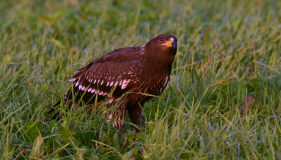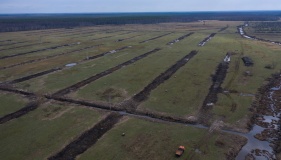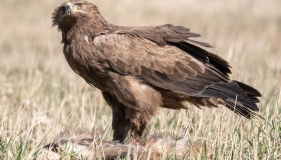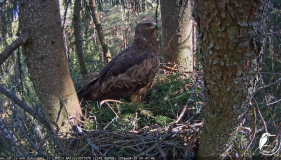Since 2017, when the Latvian Fund for Nature started to implement the project ‘Ensuring the Protection of the Lesser Spotted Eagle in Latvia’, which also includes creating the micro-reserves for the lesser spotted eagle, we have actively advocated that Latvia needs to improve and consummate the compensation mechanism for restrictions on economic activity implemented by the state to ensure nature protection. In our work, we encounter a lot of forest owners and, regardless of whether the owner supports the establishment of a micro-reserve or not, everyone agrees that appropriate compensation would be a solution that would satisfy all parties.
At present, a forest owner who owns the land where a nest of a lesser spotted eagle or another protected bird has been found and where a micro-reserve has been established receives compensation of up to 160 EUR per hectare per year. It is clear that this cannot outweigh the loss of income if the forest is to be cut down and sold in the near future. Consequently, the establishment of micro-reserves has been creating tension between forest owners and the field of nature protection in Latvia for a long time. The Latvian Fund for Nature welcomes the fact that the currently responsible ministry, the Ministry of Environmental Protection and Regional Development (VARAM), has set up a working group to address the issue of compensation.
In June of this year, Latvian forest owners published a letter expressing their dissatisfaction with the current situation and asking the Prime Minister, the Ombudsman and other senior state officials to decide on a moratorium on micro-reserves until a fair compensation mechanism is in place.
The Latvian Fund for Nature also took part in this discussion, stating that it does not support a moratorium on micro-reserves, as this is currently the only way to provide protection for diffusely nesting bird species, instead calling for a solution to the basic problem of fair compensation. In addition, it is important in Latvia to continue the discussion between various interest groups on the importance of nature protection, as well as to strengthen the nature protection goals so that they are close to the entire Latvian society. In our opinion, the process of improving the compensation system should be more active, therefore we hope for the political will of the VARAM to solve this problem.
This week we have received a letter from the Ombudsman of the Republic of Latvia, which responds to the application of forest owners, as well as a reply letter written by LDF in this regard. In their letter, the Ombudsman states that they cannot agree that ‘until the adoption of the regulatory framework on the introduction of a fair compensation mechanism, the establishment of micro-reserves would be completely stopped’. On the other hand, in response to the forest owners' letter that micro-reserves restrict the property rights of individuals, the Ombudsman recalls that ‘if a person does not agree to the establishment of a micro-reserve, they have the right to challenge and appeal against the decision to establish each specific micro-reserve’.
We are pleased that in their letter the Ombudsman also fully agrees that the biggest problem at the moment is the lack of adequate compensation for restrictions on economic activity – in this sense, the forest owners and nature protection experts and organizations are united, and we hope for VARAM to take active action.







